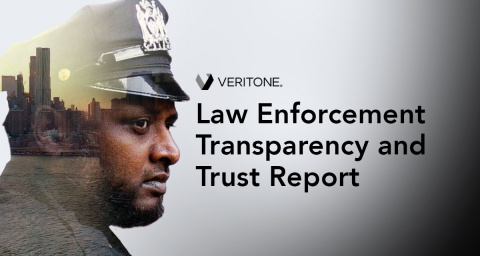Veritone Law Enforcement Transparency and Trust Report Finds Americans Mostly Aligned on Policing
- Only 1 in 5 people support defunding the police
-
Law enforcement agencies are widely trusted by their communities (
67% ) -
A majority (
62% ) of local officers say their job has become more difficult over the last five years

A key takeaway from the report, produced in partnership with research firm Lucid surveying 3,000
-
Perceptions of policing are nuanced and complex — Four in five Americans feel safe in their own communities, and 3 out of 4 say police help keep them feeling that way. Over the past five years, about as many people report a better opinion of the police as those who say their opinion is worse. The data also reveals an important truth about how perceptions are formed -
52% of people say their opinions about police are formed by direct interactions with them. -
Improving and expanding transparency is good for all — Forty-two percent of Americans feel a lack of transparency has hurt their perception of law enforcement. This lack of transparency may exacerbate misunderstandings about how police operate. Yet, opinions are mixed on LEA efforts to increase transparency. For example, while
44% of respondents wanted LEAs to increase funding for anti-racism or unconscious bias training, only22% approve of lawful collection of perceived race and other demographic information to measure for potential bias in law enforcement. Without this data collection, how can we transparently measure the efficacy of the bias training initiatives many want? With better tools and strategies, understanding between LEAs and the public can be greatly improved. -
Communities have strong opinions about the role of police — There has been much talk about “defunding the police,” yet many respondents rated their local police spending as “adequate” (
37% ) —18% say it’s too high and14% say it’s too low. Eighty-four percent say police should focus on responding to violent crime matters, while less than40% say their local police should assist with medical and mental health calls. Additionally, it’s clear police have a very big impact on public perception: 2 of the top 3 ways citizens access information and news about policing originate with the law enforcement agencies themselves. - Technology will accelerate transparency efforts — The public is generally receptive to the use of technology to improve public safety. Sixty-one percent of respondents said they would trust the police to use facial recognition technology to better identify suspects, and a significant number of respondents also supported the use of body-worn cameras but are unaware of the challenges that can delay the timely release of footage to the public. However, the public may not be aware of the benefits technology can provide behind-the-scenes for some LEAs — from distilling insights from massive datasets on criminal activity to software that automatically redacts videos and documents so they can be released more quickly to the public.
One thing that is clear - there is a disconnect in perception between the media, LEAs and the communities they serve, but all can align around the fact that there needs to be a shift in transparency and trust at the heart of those actions. LEAs, widely supported by their communities (
“We've seen an increase in the number of agencies initially coming to us to deliver on the transparency that technologies such as bodycams promised to deliver. It can take days to process footage from a stop to make it releasable to the public; news cycles move much more quickly making timely releases critical to combat false narratives,” said
“Technology is very important, especially now when we're trying to be data-driven and intelligence-driven in policing. With limited resources and the demands on law enforcement growing by the day, we have to allocate wisely,” said Chief
To read the full report visit: https://vertione.com/Law-Enforcement-Transparency-Report-2021/
About
To learn more, visit Veritone.com.
Safe Harbor Statement
This news release contains forward-looking statements, including without limitation statements regarding Veritone’s Transparency and Trust Report, the expected capabilities of Veritone’s aiWARE platform and the potential benefits of its use for law enforcement agencies and the communities they serve. Without limiting the generality of the foregoing, words such as “may,” “will,” “expect,” “believe,” “anticipate,” “intend,” “could,” “estimate” or “continue” or the negative or other variations thereof or comparable terminology are intended to identify forward-looking statements. In addition, any statements that refer to expectations, projections or other characterizations of future events or circumstances are forward-looking statements. Assumptions relating to the foregoing involve judgments and risks with respect to various matters which are difficult or impossible to predict accurately and many of which are beyond the control of
View source version on businesswire.com: https://www.businesswire.com/news/home/20210928005433/en/
klabrum@veritone.com
Source:







